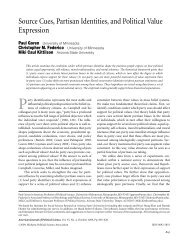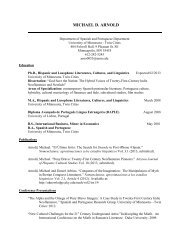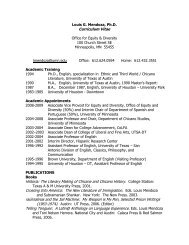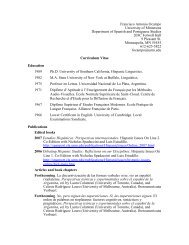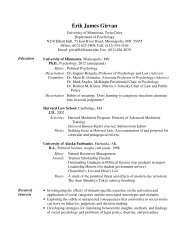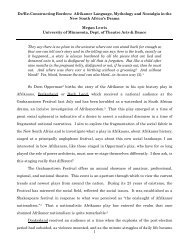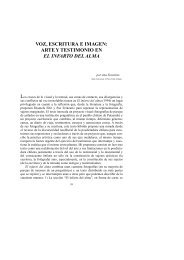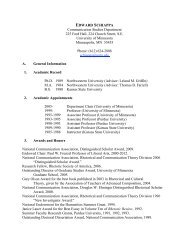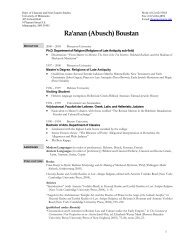- Page 1 and 2:
OJIBWE DISCOURSE MARKERS A DISSERTA
- Page 3 and 4:
Acknowledgements I am indebted to t
- Page 5 and 6:
For the elders at Mille Lacs and fo
- Page 7 and 8:
Table of Contents Acknowledgements
- Page 9 and 10:
1.0 Introduction and background In
- Page 11 and 12:
influenced by this already existing
- Page 13 and 14:
While many speakers from other Minn
- Page 15 and 16:
discussed within the body of this t
- Page 17 and 18:
use as they occurred in real time w
- Page 19 and 20:
‘someone’s fingernail’ (see N
- Page 21 and 22:
In some cases, however, where a nar
- Page 23 and 24:
adherence to the rule suggested her
- Page 25 and 26: To further compound an already comp
- Page 27 and 28: conjunction and (in sentence level
- Page 29 and 30: DMs function in relation to aspects
- Page 31 and 32: d) But, I went into the army (p. 15
- Page 33 and 34: (7) Marker because (Schiffrin 1987:
- Page 35 and 36: In (9a), because connects two actio
- Page 37 and 38: their referential and/or grammatica
- Page 39 and 40: communicator presents just enough e
- Page 41 and 42: “[i]nferential comprehension invo
- Page 43 and 44: Elements which do not relate some s
- Page 45 and 46: 1990:391). Since most researchers a
- Page 47 and 48: inventory is replete with an array
- Page 49 and 50: (12) Sentence-final 21 a) Korean (P
- Page 51 and 52: 2.3.2 Clitics and affixes As it tur
- Page 53 and 54: lead to the man’s death. Relevant
- Page 55 and 56: internal evaluation, denoting main
- Page 57 and 58: interpersonal discourse markers can
- Page 59 and 60: (18) Spanish ya (Koike 1996:275-276
- Page 61 and 62: occur in a variety of non-initial p
- Page 63 and 64: (Bazzanella 1990:633 for insomma),
- Page 65 and 66: via the processes of tense, aspect,
- Page 67 and 68: which is the core defining feature
- Page 69 and 70: so that the discourse happens in on
- Page 71 and 72: 3.1 Discourse connectives 3.1.1 Ini
- Page 73 and 74: c) Nashke! AT ‘Look!, See!, Liste
- Page 75: speaker to set that information off
- Page 79 and 80: ) Nashke azhigwa eni-apiitiziyaan,
- Page 81 and 82: predicted event. In (29b), the spea
- Page 83 and 84: two subordinate verb phrases (subor
- Page 85 and 86: a) ‘“Nobody will live there on
- Page 87 and 88: (34) English discourse marker and a
- Page 89 and 90: (36) miinawaa (Kegg 1991:152-153) a
- Page 91 and 92: 1987:128). A quick scan of the Ojib
- Page 93 and 94: Minnesota dialect) appears not to h
- Page 95 and 96: 3.1.1.4 dibishkoo In the dictionary
- Page 97 and 98: The use of dibishkoo in both exampl
- Page 99 and 100: ge-miinigooyang. that we’ll be gi
- Page 101 and 102: c) Giwiisin. d) Mii wiisiniyan. (in
- Page 103 and 104: (47) Discourse sequencer (Benjamin
- Page 105 and 106: the sentence level within the disco
- Page 107 and 108: Note that in (49a,c) where the exam
- Page 109 and 110: selecting a contrastive relationshi
- Page 111 and 112: eak from further elaboration within
- Page 113 and 114: In the stories examined for this th
- Page 115 and 116: 3.1.2.1.1 Digressions There is furt
- Page 117 and 118: f) “Mii imaa iniw ozidan, bakaan
- Page 119 and 120: preceding clause sang spiritual son
- Page 121 and 122: (59) idash (Clark 1998:8, audio) a)
- Page 123 and 124: make use of the coordinator miinawa
- Page 125 and 126: (62) Relative roots invoke initial
- Page 127 and 128:
advance a narrative to the next eve
- Page 129 and 130:
knowledge of their use, but because
- Page 131 and 132:
some time and effort trying to figu
- Page 133 and 134:
spots on your fingernails’, giga-
- Page 135 and 136:
c) Mii-gegaa gii-pi-niboyaan. so-al
- Page 137 and 138:
outside the imperative construction
- Page 139 and 140:
(71) Justifying function of aaniish
- Page 141 and 142:
(72) Extra-topical background infor
- Page 143 and 144:
speaker was given a new horse, and
- Page 145 and 146:
3.2.2.1.1 isa as a marker of closin
- Page 147 and 148:
3.2.2.1.2 isa as a marker of relinq
- Page 149 and 150:
descriptions, however, are not impo
- Page 151 and 152:
3.2.2.1.4 isa as a marker of result
- Page 153 and 154:
The initial event in (81a-b) is the
- Page 155 and 156:
Another example of this usage appea
- Page 157 and 158:
(84) isa (Jones 1917:4-5) a) O’ow
- Page 159 and 160:
speaker to exert and validate the I
- Page 161 and 162:
the speaker, once a topic or event
- Page 163 and 164:
Though the English translation does
- Page 165 and 166:
accompanies the expression and prov
- Page 167 and 168:
Not captured in (92a) is Speaker A
- Page 169 and 170:
In (93d), Speaker C, not yet knowin
- Page 171 and 172:
Here, sha reveals the unreasonablen
- Page 173 and 174:
(97) gosha (Kegg 1991:104-105) a) M
- Page 175 and 176:
an interjection (i.e. a discourse r
- Page 177 and 178:
a) ‘A girl and her grandmother we
- Page 179 and 180:
) Wegonen da? INTER CP ‘What now?
- Page 181 and 182:
) Ojibwemon bina naa! speak Ojibwe
- Page 183 and 184:
(106) bina within jussive construct
- Page 185 and 186:
(108) bina (text communication) a)
- Page 187 and 188:
eference to time (although time is
- Page 189 and 190:
speakers to speak about topics with
- Page 191 and 192:
c) Baanimaa igo naa wenji-gizhibaab
- Page 193 and 194:
The little girl in this story was t
- Page 195 and 196:
wants to express the equivalent of
- Page 197 and 198:
naa has the force of the English lo
- Page 199 and 200:
The first token of naa in (120a) ap
- Page 201 and 202:
weight of the English damn it, they
- Page 203 and 204:
going to eat, as independent order
- Page 205 and 206:
Here, the individual uses of both d
- Page 207 and 208:
The uncle’s initial utterance to
- Page 209 and 210:
4.0 Conjunct order as a discourse m
- Page 211 and 212:
The verbs in bold type in (131a) an
- Page 213 and 214:
conjoin larger discourse units abov
- Page 215 and 216:
The subordinate nature of the conju
- Page 217 and 218:
conjunct gii-pabanaazomag is not ac
- Page 219 and 220:
4.1.3 Situational immediacy There i
- Page 221 and 222:
mark these events as being more sal
- Page 223 and 224:
d) Chi-ayizhinoo’oyangid iw. very
- Page 225 and 226:
c) Haaw niinawind imbaapi’idimin
- Page 227 and 228:
without izhi remain as plain conjun
- Page 229 and 230:
jiigikana imbaapi’idimin niinawin
- Page 231 and 232:
verb. If carrying eventline informa
- Page 233 and 234:
d) They got around in boats. e) The
- Page 235 and 236:
describe these elements (which in i
- Page 237 and 238:
existed (and it might), it would be
- Page 239 and 240:
REFERENCES Abraham, Werner. 1991. D
- Page 241 and 242:
Clark, James. 1998. Oshkaabewis Nat
- Page 243 and 244:
Jucker, Andreas H. and Sara W. Smit
- Page 245 and 246:
Rhodes, Richard 1979. Some aspects
- Page 247:
Wilson, Deirdre. 1994. Discourse ma



